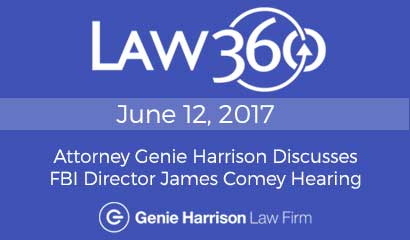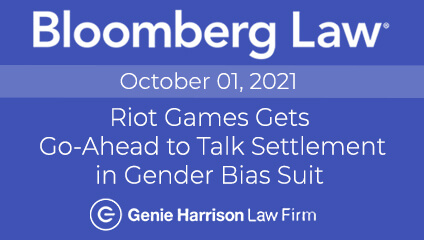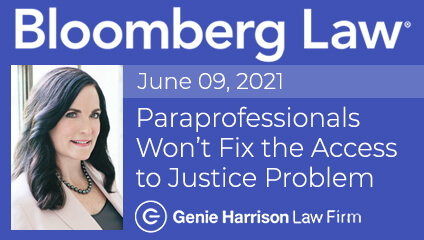“Comey Hearing Parallels What Fired Employees Face in Court”
Employment attorney Genie Harrison’s commentary on FBI Director James Comey Hearing
June 12, 2017 – by Genie Harrison for Law360.com
“At the time, did you say anything to the president about — that is not an appropriate request, or did you tell the White House counsel, that is not an appropriate request, someone needs to go tell the president that he can’t do those things?”
“You could have said ‘Mr. President, this meeting is inappropriate … You should not be making such a request.’”
“You had serious concerns about what the president had … directed you to do, and had taken no action — hadn’t even reported up the chain of command … Do you have a sense, looking back, that that was a mistake?”
“Why didn’t you say, ‘I’m not taking that call.’”
These are the types of questions that U.S. senators fired at former FBI Director James Comey during a June 8 hearing of the Senate Select Committee on Intelligence, but they may as well have been asked by defense counsel in a sexual harassment, whistleblower or wrongful termination case. That’s because deflection, attacking the victim and bolstering defenses is the name of the game when former employees, like Comey, testify about their allegations of illegal conduct by their former bosses.
Why attack the former employee like this?
The official and unofficial defense responses in a harassment or retaliation case might include:
1. Establishing the conduct complained of was not unwelcome;
2. Undermining the claim that the conduct was objectively or subjectively offensive;
3. Showing that the former employee did not reasonably believe the alleged conduct was illegal;
4. Showing the employee did not engage in protected activity by reporting the conduct;
5. Establishing the avoidable consequences defense by showing the employee failed to follow the employer’s reporting procedures so that economic damages can be limited or the claim defeated altogether;
6. Undermining that the former employer’s underlying conduct was offensive or bad enough to do something about, so defense counsel can argue the conduct wasn’t bad enough to cover up or lead to retaliation;
7. Limiting liability or damages by smearing the plaintiff;
8. Intimidating the former employee; and,
9. Confusing the jury.
Please note, this is not an exhaustive list. There are lots of reasons that can be grounded in elements of claims or defenses to provide legally valid bases for a former employer to attack a former employee who sues. The even better reasons include intimidation, humiliation and dissuasion.
Let’s think again about the Senate hearing and Comey’s testimony. Sen. Dianne Feinstein, D-Calif., told Comey, “You’re big, you’re strong. I know the Oval Office, and I know what happens to people when they walk in. There is a certain amount of intimidation. But why didn’t you stop and say, ‘Mr. President, this is wrong — I cannot discuss that with you?’”
Comey replied, “Maybe if I were stronger, I would have. I was so stunned by the conversation that I just took it in.”
Although Comey, who is 6 feet 8 inches tall, is one of the most knowledgeable and powerful law enforcement officers this country has ever produced, his responses to the senators’ questions suggested he may have felt like a deer in headlights in the Oval Office back on Jan. 27.
As a plaintiffs employment lawyer having represented many employees subjected to illegal conduct, I would fully expect Comey and any other employee in similar circumstances, to think, “Could this really be happening? Did he say what I think he just said? How do I get out of this? Why did my boss leave me alone with him? How do I say no and keep this from getting worse?”
These are normal thoughts and reactions when people unexpectedly face pressure from a powerful boss to do something they believe is wrong. The brain stutters and doubts what its ears just heard.
When women are hit on by the boss, they often tell themselves, “Wait, maybe he didn’t mean it that way. I don’t think I should jump to conclusions. Maybe I shouldn’t assume that’s what he meant.”
But no. He said exactly what he meant and she knows it, which is why the brain stutters and the employee has a visceral reaction. Like Comey, most employees have a stunned reaction, leading their minds to go blank once it becomes clear that the boss means exactly what he is saying. Then, it’s all they can do to focus and try to hear the rest of the words that follow.
Comey testified that he told himself he had to remember every word — remember every word the president was saying in what Comey described as an unusual and intimidating event. That, in and of itself, is a lot to do when he felt that the most powerful man in the country was implicitly threatening his job, as he explained in the Senate hearing.
It is no surprise that Comey could not engage in higher-level intellectual processing, immediately understand all the implications, and counterattack in the Oval Office. And if a 6-foot-8-inch, highly educated former prosecutor who was the director of the FBI froze, maybe society can now appreciate how overwhelming it is for the average employee to be in a similar situation.
In truth, there is no perfect way to handle the interactions with the boss, because no matter how these incidents are handled, former employees will still be questioned and criticized.
Shifting back to Comey’s testimony by way of example, after Comey described President Donald Trump’s statement that he “hoped” Comey could let the Flynn investigation go, Sen. Feinstein followed up with questioning about a subsequent conversation in a phone call that Trump made to Comey, “You told the president, I — I would see what we could do. What did you mean?
Comey replied, “Well, it was kind of a slightly cowardly way of trying to avoid telling him, we’re not going to do that — that I would see what we could do. It was a way of kind of getting off the phone, frankly.”
Trump has since co-opted Comey’s word, “cowardly,” and used it to attack Comey on Twitter, writing, “I believe the James Comey leaks will be far more prevalent than anyone ever thought possible. Totally illegal? Very ‘cowardly!’”
If Comey brought a whistleblower lawsuit against the government, I would expect that one theme the defense would use is that Comey’s actions, by his own admission, were “cowardly,” and now he wants the jury to reward him. This is but one example of how a former employee’s testimony can be turned against him as a brutal theme in trial.
As a plaintiffs lawyer, I wish I could waive a magic wand and eliminate the defense’s ability to attack my client in the ways I have described here, and others, because the experience is so painful and humiliating for my clients. But, I do not have that power and I recognize that sometimes, the questioning does elicit important gaps in the evidence that cause me to rethink my analysis.
So what does a plaintiffs employment lawyer do to prepare her client for the inevitable attacks?
Educate.
I educate my clients extensively about litigation and trial so they have a framework in which to understand what will happen when the defense counsel questions them. I teach them about the ways in which the defense will use the attacks and the elicited information to defend the case. I explain that the defense has an important role to play and the jury will want to have their questions answered. After all, the jury has to decide who is right and who did wrong, and they deserve our best effort to be responsive.
It is my hope that through educating my client, I will help demystify the litigation and trial processes. I am also careful to take care of my clients and support them emotionally throughout the litigation. In short, I try to be the lawyer I would want to have if I were the client, facing unyielding attacks because she is trying to right a wrong.
Then it’s my job to show the jury that the defense is choosing to attack my client, and try to confuse, instead of owning up to their bad conduct. After all, that’s what people do when they have something to hide.
“So,” I might say, “let’s stop asking why didn’t she tell her boss, ‘No, what you are asking is illegal, I protest, please stop your wrongful conduct.’ Those are questions designed to have you lose focus on the real issues. Let’s instead put the focus where it should be, which is on the boss who is touching her against her will, conditioning her job on giving him what he wants sexually, and now wants this jury to tell him it was okay to do that.”
And to the jury in Comey’s case, I would explain that their verdict has the power to heal and be a lasting affirmation that his reaction in the Oval Office says nothing about his strength, but volumes about his credibility.
Genie Harrison is lead trial attorney at the Genie Harrison Law Firm in Los Angeles.
The opinions expressed are those of the author(s) and do not necessarily reflect the views of the firm, its clients, or Portfolio Media Inc., or any of its or their respective affiliates. This article is for general information purposes and is not intended to be and should not be taken as legal advice.





